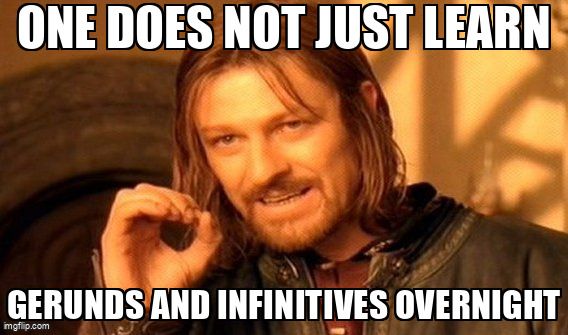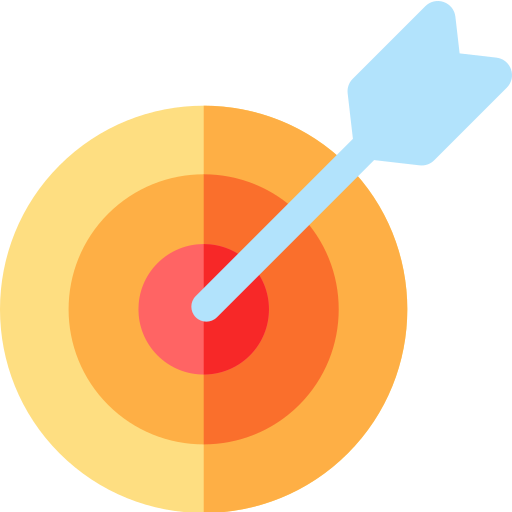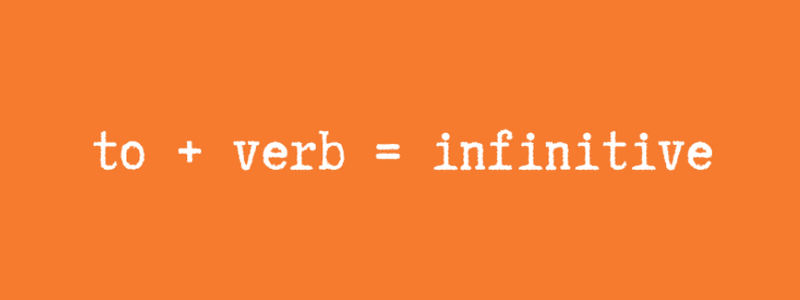"We appreciated having enough time to study."
"We hope to visit Yosemite this summer."
Can you identify the gerund and the infinitive in each sentence? Or are you perhaps wondering, "What in the world is a gerund and an infinitive?"

It takes practice and memorization. But fear not: you'll soon master gerunds and infinitives with ease!
Gerunds: when a verb becomes a noun
Gerunds are verbs that become nouns:
Cooking is my favorite activity. [Cooking is the subject of the sentence.]
I like swimming. [Swimming is the object of the sentence.]
Subject? Object? What are those?!
Grammar Focus

The subject of a sentence shows who or what does the action.
I like ice cream. [Who likes ice cream? I like ice cream. Subjects are placed before verbs in English.]
The object of a sentence is who or what is affected by the action of the verb:
I like ice cream. [What do I like? I like ice cream. Objects are placed after verbs in English.]
Subjects and objects must be nouns:
Cooking is my favorite activity. [What is my favorite activity? Cooking.]
I like swimming. [What do I like? Swimming.]
Compare: I am cooking vs. I like cooking. Our first sentence includes "am" (to be) and is followed an "ing" verb. Our second sentence includes "like" and is followed by what I like: cooking.
Quiz
Identify the sentence with a gerund. Remember: a gerund looks like a verb but is acting like a noun.
Infinitives: to +
"We offered to help our neighbor with their yard work."
Certain verbs such as offer, agree, and learn, are followed by an infinitive. An infinitive is to + a verb, e.g., to help.
Like gerunds, infinitives act as nouns. In the sentence above, we can ask, "What did we offer?" We offered to help our neighbor with their yard work.
 Image courtesy of Grammar Party
Image courtesy of Grammar Party
Quiz
Which sentence has an infinitive?
Some verbs take both gerunds and infinitives...
...and the meaning won't change.
I love dancing.
I love to dance.
Both sentences convey the same idea.

You may be thinking, "But you've just told me that I have to memorize which verbs take a gerund or which take an infinitive!" Well, you do.
However, verbs of preference such as like, love, and hate (think "emotional verbs") can take both a gerund and an infinitive, without a change in meaning. Think of them as "either/or" verbs.
Quiz
Choose the sentences that convey the same idea:
Some verbs change meaning
Some verbs can change meaning, depending on whether they come before a gerund or infinitive.

Consider:
I stopped to buy ice cream.
I stopped buying ice cream.
Can you spot how the meaning is different in each sentence?
Let's look more closely at each sentence:
I stopped to buy ice cream. [What did I stop doing? Was this before or after the ice cream?]
I stopped buying ice cream. [Well, that's sad! Why did I stop?]
In our first sentence, I was doing another action. I was driving home. While driving, I saw an ice cream shop and I stopped (driving) to buy ice cream.
In our second sentence, I stopped doing an action for good — in this case, stopped buying ice cream completely. We might use this construction if we're stopping something unhealthy or even dangerous, e.g. "I stopped smoking."
Quiz
You're walking through a garden. You stop to look at the flowers. What are you doing right now?
Put knowledge to practice!
Now that you have an understanding of gerunds and infinitives, it's time to use your knowledge!

Here are some fun and practical activities to try:
Read a news story, book, or article. Pay attention to which verbs take gerunds and which take infinitives.
Summarize a video or movie, using gerunds & infinitives to describe key moments.
Take Action

Your feedback matters to us.
This Byte helped me better understand the topic.
